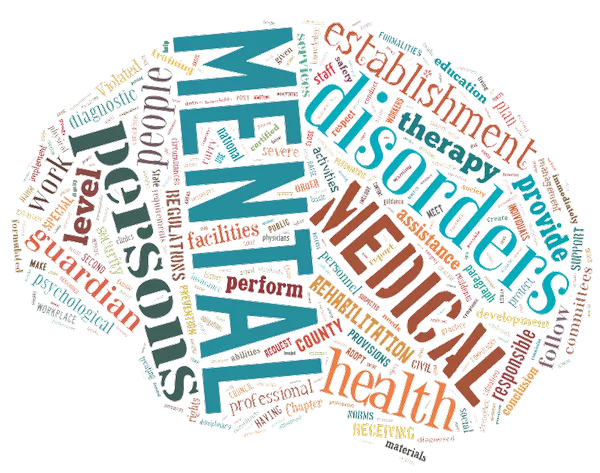Thought disorder, often referred to as formal thought disorder, is a complex and perplexing mental health condition that affects an individual’s thought processes. It can significantly impact one’s ability to communicate, think logically, and maintain a coherent stream of thought. In this comprehensive exploration, we delve into the intricate world of thought disorders, dissecting their symptoms and shedding light on this often-misunderstood mental health challenge.
What is Thought Disorder?
Thought disorder is a mental health condition characterized by disturbances in a person’s thought processes. It can manifest in various ways and may result in disorganized thinking, impaired communication, and difficulty distinguishing between reality and imagination. Individuals with thought disorder may find it challenging to convey their ideas coherently, leading to disjointed speech patterns and fragmented thought content.
Symptoms of Thought Disorder
1. Disorganized Thinking: Disorganized thinking is a hallmark symptom of thought disorder. It involves a breakdown in the logical flow of thoughts. Individuals with this symptom may struggle to organize their ideas or connect them logically, leading to incoherent speech and fragmented thought patterns. Conversations with someone experiencing disorganized thinking may feel disjointed and confusing.
2. Tangentiality: Tangentiality is a thought disorder symptom characterized by wandering off-topic during conversations. A person may start a conversation on one subject but quickly veer off onto unrelated tangents, making it challenging to maintain a coherent and focused discussion.
3. Loosening of Associations: This symptom involves a weakened connection between thoughts. When a person experiences loosening of associations, their speech may jump from one idea to another without apparent logical connections. This disjointed thought process can make it difficult for others to follow their train of thought.
4. Word Salad: Word salad is a severe form of thought disorder in which a person’s speech becomes a jumble of unrelated words and phrases. It can render communication nearly unintelligible. Conversations with individuals experiencing word salad may sound like a nonsensical mix of words and ideas.
5. Neologisms: Neologisms are newly created words or phrases that have no meaning outside the individual’s mind. People with thought disorder may use these neologisms in their speech, making it challenging for others to understand them.
6. Incoherence: Incoherence refers to speech that lacks logical or grammatical structure. Individuals with this symptom may string together words and phrases that do not form coherent sentences, making communication extremely difficult.
7. Delusions: While not exclusive to thought disorder, delusions can be a prominent symptom. Delusions are false beliefs that are firmly held despite evidence to the contrary. Individuals with thought disorder may experience bizarre or irrational delusions that contribute to their disorganized thinking.
8. Hallucinations: Hallucinations involve perceiving sensory experiences that do not exist. Auditory hallucinations, such as hearing voices, are common in thought disorder. These hallucinations can further disrupt a person’s thought processes and contribute to their disorganized thinking.
9. Impaired Reality Testing: Impaired reality testing refers to a person’s difficulty distinguishing between their inner thoughts and external reality. They may have trouble recognizing that their delusions or hallucinations are not based in reality.
10. Concrete Thinking: In contrast to disorganized thinking, some individuals with thought disorder may exhibit concrete thinking. Concrete thinking is characterized by an overreliance on literal interpretations and difficulty grasping abstract concepts or metaphors.
11. Derailment: Derailment is a thought disorder symptom where a person’s speech is derailed from its original topic by minor distractions or external stimuli. They may struggle to maintain a consistent train of thought during conversations.
12. Impaired Concentration: People with thought disorder often experience difficulty focusing and maintaining concentration. This symptom can interfere with their ability to engage in meaningful tasks or conversations.
Causes of Thought Disorder
The precise causes of thought disorder are not fully understood, but several factors may contribute to its development:
Schizophrenia: Thought disorder is commonly associated with schizophrenia, a severe mental health condition characterized by disorganized thinking, hallucinations, and delusions.
Bipolar Disorder: Some individuals with bipolar disorder may experience thought disorder symptoms during manic or psychotic episodes.
Substance Abuse: The use of certain substances, such as hallucinogens or stimulants, can induce thought disorder-like symptoms.
Neurological Conditions: Brain injuries, tumors, or other neurological conditions can disrupt thought processes and lead to thought disorder symptoms.
Trauma: Severe emotional or psychological trauma may contribute to disorganized thinking and other thought disorder symptoms.
Treatment for Thought Disorder
Treatment for thought disorder typically involves a combination of psychotherapy, medication, and support:
Antipsychotic Medications: Medications, such as antipsychotics, are often prescribed to manage symptoms of thought disorder, including hallucinations and delusions.
Psychotherapy: Cognitive-behavioral therapy (CBT) and other forms of psychotherapy can help individuals with thought disorder learn to manage their symptoms, improve communication skills, and challenge irrational beliefs.
Hospitalization: In severe cases, individuals with thought disorder may require hospitalization for stabilization and treatment.
Supportive Services: Supportive services, including social support networks and vocational rehabilitation, can help individuals with thought disorder lead fulfilling lives.
In conclusion, thought disorder is a complex mental health condition characterized by disturbances in thought processes, communication, and reality perception. Understanding its symptoms and potential causes is crucial for early intervention and effective treatment. With the right support and treatment, individuals with thought disorder can learn to manage their symptoms and improve their overall quality of life.

